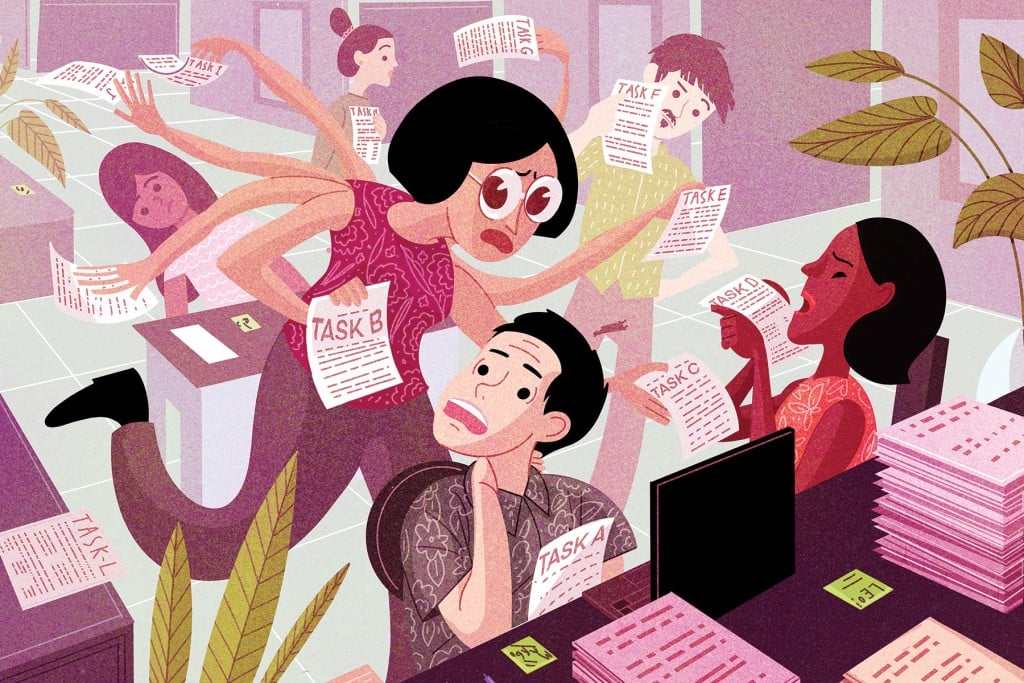Magic Conversations

How to set boundaries with a co-worker who is taking advantage of you.
Q: I’m a 56-year-old woman who shares an office with a younger woman with keiki. We get along well, and I have tried to help her by staying an extra hour or two to finish our projects while she leaves to pick up her children. I raised kids myself so I know how hard it can be. But I feel like she now just assumes I’ll stay to wrap up anything that needs completion by the end of the day. I really don’t want to be rude to her, but how do I get out of this pattern?
A: Have you checked with your supervisor about adjusting work hours? This situation could turn out to be a win-win, if you’re OK with starting and leaving work a bit later. Your co-worker can handle the early shift, and when your hours overlap you can collaborate. But if that won’t work, you need to address this situation before resentment builds further.
I asked Kim Willis, a Lahaina-based life coach and licensed marriage and family therapist, for advice on how she’d handle it (kimwillislifecoach.com). “This is all about communication and boundary setting,” Willis says. She suggests using her favorite communication tool, which she calls “the Magic Formula.” When I hear magic, I’m picturing unicorn whiskers, but Willis explains, “It is magical because when used it is about making you have the problem, not the other person being the problem.” They are therefore more receptive to listening, she says. Here’s how this framework looks:
- I feel______ (resentful, upset, frustrated, etc)
- When you______ (ask me frequently for my help)
- Because______ (I feel taken advantage of, I feel it’s inequitable, etc.)
- I would like______ (you to not ask me unless we can work it out where we trade off times).
If you’re uncomfortable having this conversation face to face, you can text or email it. Willis warns that once a boundary has been set, “it is usually tested to see if you will follow through. If that happens, remind your co-worker of the conversation you had and stay firm.”
And good news, the Magic Formula works to positively reinforce another person’s behavior. For example:
- “I felt grateful …
- When you found someone else to help you with your children …
- Because I really don’t like staying late after work.”
Good communication does feel like magic. Hope this works for you!
Q: As an emergency room supervisor, I have been reading that implicit bias may affect medical care. I’m wondering what you think of doing unconscious bias training.
A: Most of us want to view ourselves as nonracist, nonsexist, nonheterosexist, nonweight-biased – to feel that we are completely open-minded, awesome, fair people. Based on the data, though, we actually start to pick up prejudices and stereotypes as early as toddlerhood, and these cause us to discriminate in ways we don’t realize. In medicine, for example, studies have shown that African American and Hispanic patients are less likely to receive adequate pain medication.
‘Aiea-based Makana Risser Chai (risserchai.com) is a trainer, HR consultant and former Silicon Valley attorney who teaches courses on creating respectful workplaces. “We’ve seen a lot of emphasis on sexual harassment, and now more progressive organizations are beginning to talk about implicit bias,” she says.
She notes that while Hawai‘i has diverse workplaces, it’s not immune to unconscious bias. “It may take the form of talking over someone in meetings, not asking someone’s opinion, or making assumptions about a person based on whether they are local or a new Mainland transplant,” she says.
Risser Chai likes to reframe unconscious bias testing/training as training people to treat others with dignity and respect. “All the research shows that the companies that are the most diverse and the most inclusive have the best results,” says Risser Chai. “When you have a diverse and engaged workforce, you solve problems in the best ways possible.” This type of training is usually initiated by an HR department and if there is a legal department, it should be included as well.
If you are a manager, you can help by creating systems and strategies to help your team avoid unconscious bias. For example, instead of one gatekeeper for hiring, have a committee with a diverse range of people. For workplaces such as orchestras, blind auditions can be useful, where the gender of the auditioning musician can’t be seen from the other side of a screen, but the “blind” technique can also used by companies, especially in the tech world, where any trace of name, race and gender is removed from a resume before it is sent to a hiring manager.
Avoid pay inequity by having transparent compensation levels. And to get more diversity in leadership roles, set up a mentorship program in which a senior staffer is not just a remote sounding board but is truly responsible for guiding the junior staffer, Risser Chai suggests. That includes “championing their ideas, introducing them to other key decision-makers and sponsoring them to attend meetings.”
If you want to test your own biases, take free and enlightening tests via Harvard’s Project Implicit (harvard.edu/implicit). The quizzes check biases in a variety of areas, including religion, gender and skin tone. It can feel uncomfortable to be confronted with biases we don’t know we’re harboring, but it’s worth an honest look.
Q: Help! At the end of the day, one of my co-workers changes into his workout clothes in the men’s room – that’s fine, whatever – but then he’ll get distracted and start wandering around, looking for a file, chatting at the water cooler, using the paper shredder. He’s standing there in a long baggy tee and short shorts, and I’m worried a client will stop by and think he’s not wearing pants under that shirt. What do I do?
A: The gym-rat look is definitely not appropriate for the office, even after hours. If you have a good relationship with him, maybe you can try a joke, like, “Hey, Bill, you’re driving us all wild with those calf muscles; can you maybe move it along to the gym?” If you don’t have a good relationship with him, reach out to human resources, which can remind him about the office dress code.






